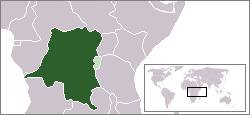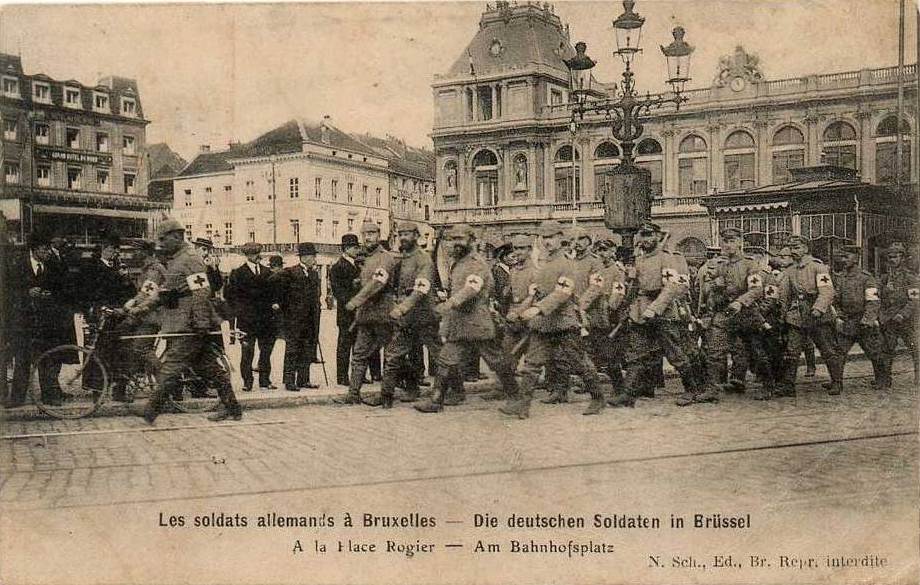|
Félix Fuchs
Félix Alexandre Fuchs (1858–1928) was a Belgian colonial civil servant and lawyer who served as Governor-General of the Belgian Congo between 1912 and 1915. A lawyer by profession, Fuchs joined the administration of the Congo Free State in 1888 as a jurist and quickly rose through the ranks. Considered a Liberal, Fuchs's civilian background and attitudes distinguished him from the majority of colonial administrators who had begun their careers in the military. Rising to the highest ranks of the administration in the late 1890s, Fuchs eventually became Governor-General after the Congo's annexation by Belgium and presided over the Congo's entry into World War I. Career Fuchs was born into a family of Prussian origin in Ixelles, Brussels in Belgium on 25 January 1858. He was naturalised as a Belgian citizen in 1862 and, in 1876, went to study Law at the Free University of Brussels. He later practiced as a lawyer at the court of appeal in Brussels. In 1887, Fuchs began wo ... [...More Info...] [...Related Items...] OR: [Wikipedia] [Google] [Baidu] |
List Of Colonial Governors Of The Congo Free State And Belgian Congo
This is a list of European colonial administrators responsible for the territory of the Congo Free State and Belgian Congo (today the Democratic Republic of the Congo). International Association of the Congo Prior to the creation of the Congo Free State, the International Association of the Congo (IAC) had signed treaties with over 300 native Congolese chiefs and in effect exercised sovereignty over a large area of the Congo Basin. The IAC was headquartered in Belgium and run by a committee under the presidency of Maximilien Strauch. Prior to the creation of the office of Administrator-General, authority on the ground in the Congo had been exercised by a Chief of Expedition, who until April 1884 was Henry Morton Stanley. Congo Free State Administrators-General / Governors-General Vice Governors-General Belgian Congo On 1 July 1960, the Belgian Congo became independent as the Republic of the Congo (''République du Congo''). See also * Belgian colonial empire * Minist ... [...More Info...] [...Related Items...] OR: [Wikipedia] [Google] [Baidu] |
Foreign Service
Diplomatic service is the body of diplomats and foreign policy officers maintained by the government of a country to communicate with the governments of other countries. Diplomatic personnel obtains diplomatic immunity when they are accredited to other countries. Diplomatic services are often part of the larger civil service and sometimes a constituent part of the foreign ministry. Some intergovernmental organizations, such as the European Union, and some international non-state organizations, such as the Sovereign Military Order of Malta, may also retain diplomatic services in other jurisdictions. For non-state organizations, the reciprocation of diplomatic recognition by other jurisdictions is difficult, as diplomacy tends to establish the concept of recognition upon an assumed sovereignty over geographical territory; the SMOM, in this case, receives diplomats at its headquarters in Rome, as all permanent missions to the SMOM are jointly accredited as permanent missions to the Hol ... [...More Info...] [...Related Items...] OR: [Wikipedia] [Google] [Baidu] |
Royal Museum For Central Africa
The Royal Museum for Central Africa or RMCA ( nl, Koninklijk Museum voor Midden-Afrika or KMMA; french: Musée royal de l'Afrique centrale or MRAC; german: Königliches Museum für Zentralafrika or KMZA), also officially known as the AfricaMuseum, is an ethnography and natural history museum situated in Tervuren in Flemish Brabant, Belgium, just outside Brussels. It was built to showcase King Leopold II's Congo Free State in the International Exposition of 1897. The museum focuses on the Congo, a former Belgian colony. The sphere of interest, however, especially in biological research, extends to the whole Congo River basin, Middle Africa, East Africa, and West Africa, attempting to integrate "Africa" as a whole. Intended originally as a colonial museum, from 1960 onwards it has focused more on ethnography and anthropology. Like most museums, it houses a research department in addition to its public exhibit department. Not all research pertains to Africa (e.g. research on ... [...More Info...] [...Related Items...] OR: [Wikipedia] [Google] [Baidu] |
Jules Renkin
Jules Laurent Jean Louis Renkin (3 December 1862 – 15 July 1934) was a Belgium, Belgian politician. He served as the minister of colonies for the Belgian Congo from 30 October 1908 to 21 November 1918. Born in Ixelles, Renkin studied and practised law, and helped found the journal ''L'Avenir Sociale''. In 1896 he was elected as a member of the Catholic Party (Belgium), Catholic Party to the Belgian Chamber of Representatives for Brussels, a seat he held until his death. Original on the Christian Democracy, Christian Democratic wing of the party, Renkin's views became more conservative with time. He held several ministerial posts, Justice in 1907–1908, Colonies from 1908 to 1918, the Interior in 1918–1920, and Railway and Posts from 1918 to 1921. In 1920 he was named an honorary minister of State. In 1931 he became the prime minister of Belgium, also holding the Interior, Minister of Finance (Belgium), Finance, and Health portfolios. His government was unable t ... [...More Info...] [...Related Items...] OR: [Wikipedia] [Google] [Baidu] |
German East Africa
German East Africa (GEA; german: Deutsch-Ostafrika) was a German colony in the African Great Lakes region, which included present-day Burundi, Rwanda, the Tanzania mainland, and the Kionga Triangle, a small region later incorporated into Mozambique. GEA's area was , which was nearly three times the area of present-day Germany and double the area of metropolitan Germany at the time. The colony was organised when the German military was asked in the late 1880s to put down a revolt against the activities of the German East Africa Company. It ended with Imperial Germany's defeat in World War I. Ultimately GEA was divided between Britain, Belgium and Portugal and was reorganised as a mandate of the League of Nations. History Like other colonial powers the Germans expanded their empire in the Africa Great Lakes region, ostensibly to fight slavery and the slave trade. Unlike other imperial powers, however they never formally abolished either slavery or the slave trade and preferre ... [...More Info...] [...Related Items...] OR: [Wikipedia] [Google] [Baidu] |
Lake Tanganyika
Lake Tanganyika () is an African Great Lake. It is the second-oldest freshwater lake in the world, the second-largest by volume, and the second-deepest, in all cases after Lake Baikal in Siberia. It is the world's longest freshwater lake. The lake is shared among four countries—Tanzania, the Democratic Republic of the Congo (DRC), Burundi, and Zambia, with Tanzania (46%) and DRC (40%) possessing the majority of the lake. It drains into the Congo River system and ultimately into the Atlantic Ocean. Etymology "Tanganika" was the name of the lake that Henry Morton Stanley encountered when he was at Ujiji in 1876. The name first originated from the Bembe language when they arrived in South Kivu around the 7th century, they discovered the lake and started calling it “êtanga ‘ya’ni’â” which means “a big river” in their Bantu language. Stanley found also other names for the lake among different ethnic groups, like the Kimana, the Yemba and the Msaga. An alt ... [...More Info...] [...Related Items...] OR: [Wikipedia] [Google] [Baidu] |
Congo Act Of 1885
The Berlin Conference of 1884–1885, also known as the Congo Conference (, ) or West Africa Conference (, ), regulated European colonisation and trade in Africa during the New Imperialism period and coincided with Germany's sudden emergence as an imperial power. The conference was organized by Otto von Bismarck, the first chancellor of Germany. Its outcome, the General Act of the Berlin Conference, can be seen as the formalisation of the Scramble for Africa, but some historians warn against an overemphasis of its role in the colonial partitioning of Africa, and draw attention to bilateral agreements concluded before and after the conference. The conference contributed to ushering in a period of heightened colonial activity by European powers, which eliminated or overrode most existing forms of African autonomy and self-governance. Of the fourteen countries being represented, six of them – Austria-Hungary, Russia, Denmark, the Netherlands, Sweden–Norway, and the Unite ... [...More Info...] [...Related Items...] OR: [Wikipedia] [Google] [Baidu] |
Political Neutrality
A neutral country is a state that is neutral towards belligerents in a specific war or holds itself as permanently neutral in all future conflicts (including avoiding entering into military alliances such as NATO, CSTO or the SCO). As a type of non-combatant status, nationals of neutral countries enjoy protection under the law of war from belligerent actions to a greater extent than other non-combatants such as enemy civilians and prisoners of war. Different countries interpret their neutrality differently: some, such as Costa Rica, have demilitarized, while Switzerland holds to "armed neutrality", to deter aggression with a sizeable military, while barring itself from foreign deployment. Not all neutral countries avoid any foreign deployment or alliances, as Austria and Ireland have active UN peacekeeping forces and a political alliance within the European Union. Sweden's traditional policy was not to participate in military alliances, with the intention of staying neutral in t ... [...More Info...] [...Related Items...] OR: [Wikipedia] [Google] [Baidu] |
German Occupation Of Belgium During World War I
The German occupation of Belgium (french: link=no, Occupation allemande, nl, Duitse bezetting) of World War I was a military occupation of Belgium by the forces of the German Empire between 1914 and 1918. Beginning in August 1914 with the invasion of neutral Belgium, the country was almost completely overrun by German troops before the winter of the same year as the Allied forces withdrew westwards. The Belgian government went into exile, while King Albert I and the Belgian Army continued to fight on a section of the Western Front. Under the German military, Belgium was divided into three separate administrative zones. The majority of the country fell within the General Government, a formal occupation administration ruled by a German general, while the others, closer to the front line, came under more repressive direct military rule. The German occupation coincided with a widespread economic collapse in Belgium with shortages and widespread unemployment, but also with a ... [...More Info...] [...Related Items...] OR: [Wikipedia] [Google] [Baidu] |
German Invasion Of Belgium (1914)
The German invasion of Belgium was a military campaign which began on 4 August 1914. Earlier, on 24 July, the Belgian government had announced that if war came it would uphold its neutrality. The Belgian government mobilised its armed forces on 31 July and a state of heightened alert () was proclaimed in Germany. On 2 August, the German government sent an ultimatum to Belgium, demanding passage through the country and German forces invaded Luxembourg. Two days later, the Belgian government refused the demands and the British government guaranteed military support to Belgium. The German government declared war on Belgium on 4 August; German troops crossed the border and began the Battle of Liège. German military operations in Belgium were intended to bring the 1st, 2nd and 3rd Armies into positions in Belgium from which they could invade France, which, after the fall of Liège on 7 August, led to sieges of Belgian fortresses along the river Meuse at Namur and the surrender of the ... [...More Info...] [...Related Items...] OR: [Wikipedia] [Google] [Baidu] |

.jpg)





